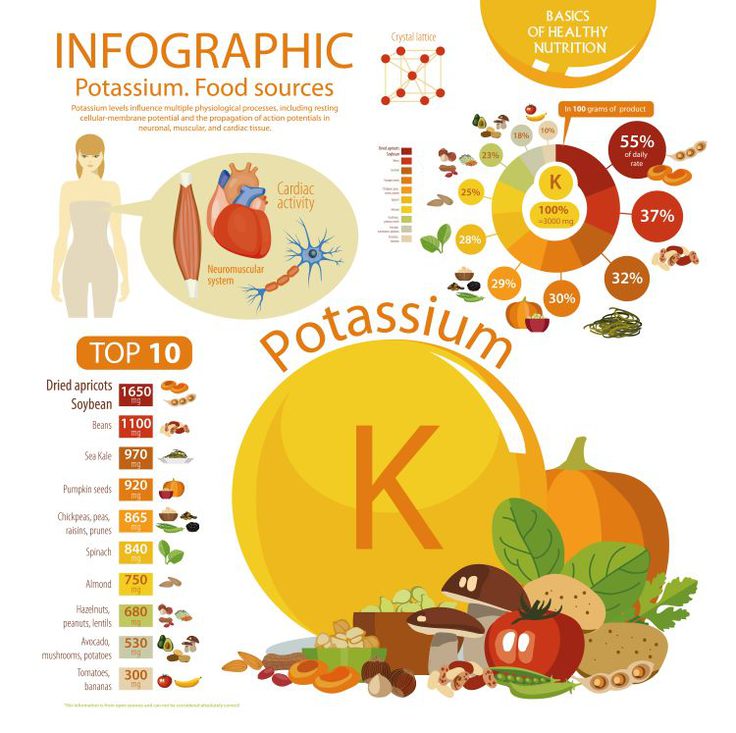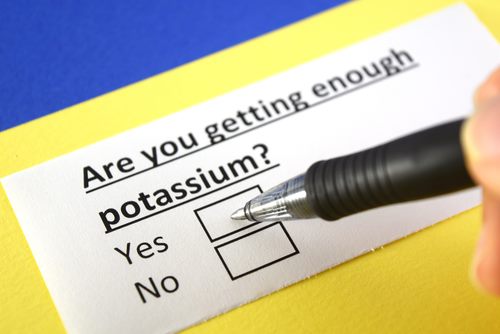High Potassium Food List
THIS POST MAY CONTAIN AFFILIATE LINKS. PLEASE SEE OUR FULL DISCLOSURE POLICY FOR DETAILS.
Here’s a list of potassium rich foods that you need to add to your diet as soon as possible!
Potassium is both a mineral and an electrolyte: It’s vital for proper nerve and muscle function, and it’s essential for keeping the brain, heart, kidneys, and other organs healthy and in good working order. Like many other minerals and electrolytes, potassium is used at a higher rate when the body is hard at work, so it’s very important to consume high-potassium foods and drinks to prevent depletion when increased activity promotes sweating.
Besides on overview of the benefits of potassium, you’ll find a useful list containing more than 225 high-potassium foods to enjoy as part of your regular diet.
How Much Potassium Do I Need?

The recommended daily intake for potassium varies by age. So long as you are healthy and not on a low-potassium diet, it’s a good idea to follow scientifically backed recommendations laid out by the Food and Nutrition Center of the Institute of Medicine, and aim to meet daily minimum requirements for potassium intake. These minimum requirements are widely accepted; however, there are no published upper limits:
- Infants between 0 to 6 months: 400 mg/day
- Infants between 7 to 12 months: 700 mg/day
- Children between 1 to 3 years: 3,000 mg/day
- Children between 4 to 8 years: 3,800 mg/day
- Children between 9 to 13 years: 4,500 mg/day
- Children between 14 to 18 years: 4,700 mg/day
- Adults age 18 and up: 4,700 mg/day
- Women wo are pregnant: 4,700 mg/day
- Women who are breastfeeding: 5,100 mg/day
Some individuals need higher levels of dietary potassium due to a condition called hypokalemia, or low potassium. There are many different causes of hypokalemia; however, the most common is increased urination brought on as a side effect of certain medications prescribed for people with heart disease or high blood pressure. Other causes include:
- Vomiting
- Diarrhea
- Excess alcohol intake
- Laxative use
- Low magnesium
- Tobacco use
- Certain antibiotics
- Certain asthma medications
- Folic acid deficiency
- Diuretic use
- Heavy sweating
- Kidney disease
- Adrenal gland dysfunction
- Diabetic ketoacidosis
Women sometimes experience low potassium during pregnancy, usually associated with morning sickness and/or diarrhea or with the use of laxatives. If you are pregnant, then low potassium can bring side effects like swelling (edema) and muscle cramps. Adding more high-potassium foods can help keep you comfortable until your baby arrives.
Be sure to talk to your doctor if you think that you have low potassium levels, particularly if your symptoms are severe or painful. Low potassium can be an indication of an underlying issue
Potassium Benefits
Your body uses potassium for a variety of essential functions. Without enough, your system finds it very difficult to do some basic tasks – and you might notice low potassium symptoms such as muscle spasms, leg cramps, fatigue, weakness, severe headaches, and eye twitching. People with chronic potassium deficiency experience serious health problems including high blood pressure, heart palpitations, anemia, intestinal pain, swollen glands, and even diabetes. People with low potassium are also at a higher risk for stroke.
Some of the specific ways potassium benefits your body include:
- Helps the body build proteins
- Breaks down carbohydrates and facilitates their use
- Builds muscle cells
- Protects blood vessels from damage
- Prevents blood vessel walls from hardening/thickening over time
- Helps maintain high calcium levels for healthy bones
- Maintains normal cellular growth and function
- Maintains and regulates fluid balance in the body
- Controls the heart’s electrical activity
- Maintains a balance between acids and bases in the body
- Maintains proper blood pressure
- Stimulates brain activity
- Balances the nervous system
- Helps keep blood sugar levels stable
- Prevents muscle cramps
- Prevents irritability
- Aids in the management of stress and anxiety
It’s important to note that some people should be careful not to eat too many high-potassium foods; for example, those with kidney problems, particularly individuals who rely on dialysis, should be very careful to watch their intake. According to the National Kidney Foundation, it is important for compromised individuals to follow strict dietary guidelines to keep potassium at a safe level. Knowing which foods are highest in potassium can help kidney patients and others avoid potential complications. Be sure to speak with your health care provider to determine your best course of action.
High Potassium Food List: 225+ Best Foods for Potassium
Many whole, natural foods are high in potassium, and as you scan the list that follows, you’ll notice that some classic “brain foods” are featured. There’s a good reason for this: Foods that contain high levels of potassium encourage oxygen to reach hungry brain cells, resulting in better neural function. Use this list of high-potassium foods as a tool for making better choices at every meal, and you’ll notice that you feel more alert. With continued healthy eating, you’ll find that your body functions well and you feel better than ever.
High-Potassium Foods vs. Supplements
With so many high-potassium foods to choose from, most people find that they can increase their potassium intake easily with no need for added supplementation. If you feel like taking a supplement instead of changing your diet, be sure to talk with your doctor beforehand. Because of the potential for drug interactions and sometimes-serious side effects, it’s vital to double-check. Despite the fact that potassium is a very simple mineral that occurs naturally, balance is the key to good health.
Sources:
http://www.highpotassiumfoods.org/links-to-food-potassium-tables
http://www.umm.edu/health/medical/altmed/supplement/potassium

